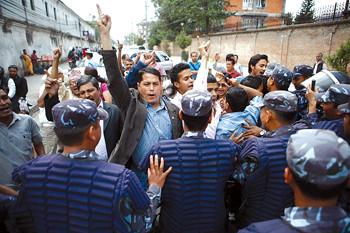Nepal’s judiciary must lead the country out of the political morass it helped create

BIKRAM RAI
UNACCEPTABLE: Human rights activists protest outside Singha Darbar on Wednesday against the appointment of Lok Man Singh Karki as chief of the CIAA.
Two weeks have passed since the controversial appointments to vacant constitutional bodies were ratified by the president’s office on the recommendation of the Constitutional Council, but the blame game between political parties, Singha Darbar, and Shital Niwas continues.
The top political leaders see nothing wrong with a tainted individual like Lok Man Singh Karki heading the anti-corruption watchdog, while Khil Raj Regmi and his band of merry ex-bureaucrats say the appointment was done by political consensus. Even President Ram Baran Yadav, who had stood firm against several controversial ordinances forwarded by the former Baburam Bhattarai government, changed his mind overnight and signed Karki in.
The political parties, under pressure from within their own ranks, have been passing the buck to ‘The Hidden Hand’. They know that we know that such a decision could not have been taken without a settlement of mutual interests. In fact, we have it on a reliable source that it was a four-bags-full deal.
So when the NC and UML leadership claim that they got played by the Maoists and Madhesis who wanted Karki to cover their corruption while in government, it reeks of political opportunism because there are pending cases of corruption against every major political party and its leaders in the anti-graft body.
Nepalis should be worried, if they aren’t already, that the affairs of this sovereign state are in the hands of individuals who are capable of selling the national interest to the highest bidder. But they have their hands tied, they can’t throw these leaders out until there are elections.
Last year’s decision of the Supreme Court to order the dissolution of the legislature without guaranteeing elections closed all constitutional doors for the people to hold the executive accountable. Now, the court has issued a contempt charge against Kantipur’s editor, publisher, and columnist. But assuming that we still live in a democracy, no organ of the state is above public scrutiny, not even the judiciary since it has been deployed to play the executive role.
Rather than picking on the fourth estate, the court should have provided the country with a constitutional remedy to get us out of the mess it helped create in the first place.
On Wednesday the Supreme Court issued a show cause notice on Karki’s appointment and ordered the Regmi-led interim election council to provide reasons within 15 days as to why it took the decision.
Meanwhile, the Karki affair has been a welcome distraction for those who want to postpone elections indefinitely and exacerbate instability in the country to undermine the achievements of the 2006 movement. Recent public opinion polls (including in
this paper) that show strong disapproval of ethnicity-based federalism have encouraged these forces, which have been raking-up nationalist sentiments against the core values of the Interim Constitution.
There is no doubt the parties who were championing the agenda for change have let the people down, which is why they are reluctant to face them in a vote. But Nepalis aren’t disillusioned enough to give up, they still hold the government and leaders accountable for six wasted years.
At a time when the legislature lies unceremoniously dissolved and the judiciary is playing the role of the executive, it is up to the media and civil society to galvanise public support for elections. They must also create positive pressure on the political leadership as a warning that they can’t stand in the shadows and make ad hoc appointments to constitutional bodies.
If Nepal’s fractured civil society wants to build a united movement, its members must take off their multi-coloured political hats and hold everyone equally responsible for Karki’s appointment. It’s their own legacy of the 2006 movement that they are protecting.
Given complex caste and class interests, it looks unlikely that Kathmandu’s powerful players can put aside their internal differences to lodge a united movement to reclaim the republic. As for the citizens, sooner or later when given the chance to vote freely, they will throw this whole lot out of power.